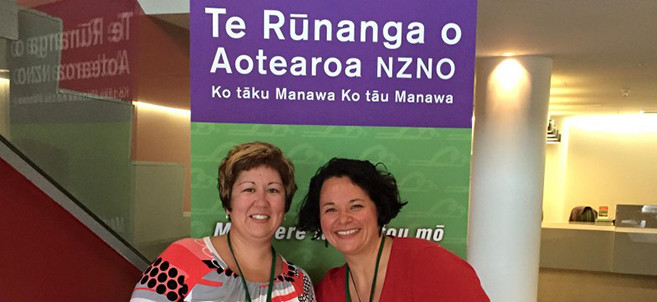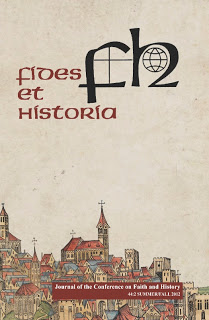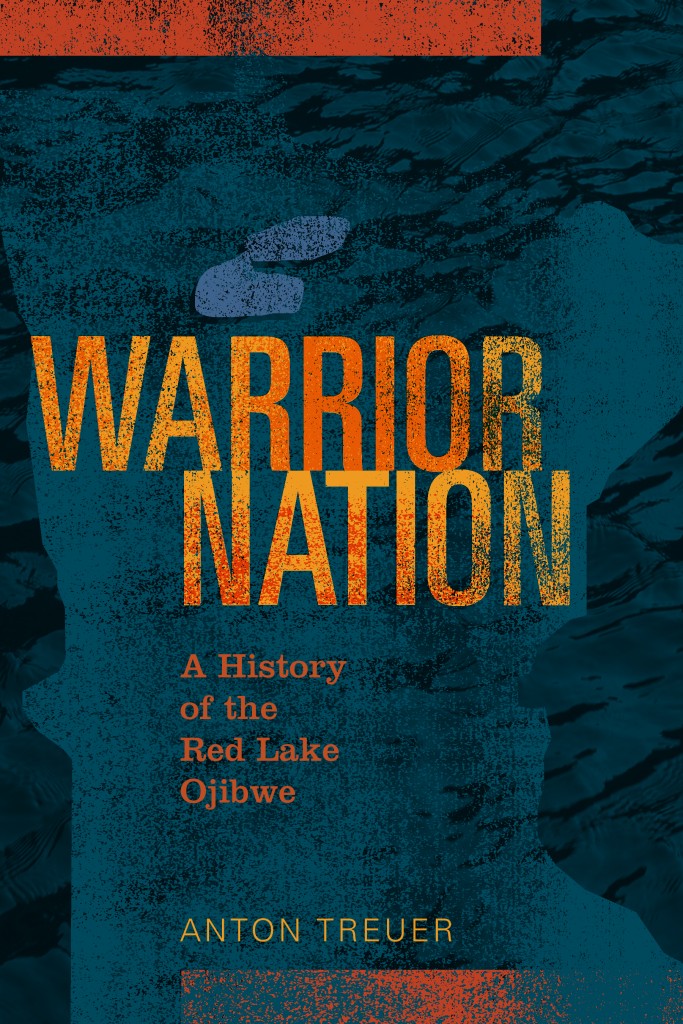
• Dr. Misty Condiff (pictured, left), assistant professor of nursing, was the keynote speaker at the Aotearoa Indigenous Nurses Conference, Aug. 7-9 in Auckland, New Zealand. Her presentation was entitled “The Lived Experience of American Indian Organ Donors and Recipients: Stories of Cultural, Physical and Spiritual Triumph.” The conference is sponsored by the New Zealand Nurses Association to advocate for Māori health care issues. Condiff is pictured with Dr. Terryann Clark, senior lecturer in nursing at New Zealand’s University of Aukland.
Condiff also attended the Association for Multicultural Affairs in Transplantation conference, Sept. 22-25 in Detroit. A member of the association’s Board of Directors, she presented on organ donation in American Indians.
In Other News…
• Erika Bailey-Johnson, BSU sustainability coordinator, presented at the Association for the Advancement of Sustainability in Higher Education’s annual conference, Oct. 25-28 in Minneapolis. She was one of four co-presenters at an all-day pre-conference workshop entitled “Sustainability, Diversity, Equity and Inclusion Across the Curriculum.” The workshop aimed to support faculty and staff of all disciplines who wish to integrate these topics into their curriculum, with a particular goal of closing the opportunity gap for students of color. She also presented “Including Mental and Physical Wellness in the Sustainability Model” and joined BSU alum Alexandra Miller for a poster presentation on the process to propose a bottled water ban at the university.
• Dr. Valicia Boudry, associate professor of mass communication, and Dr. Mary Fairbanks, associate professor of nursing, have received Quality Matters certification for online courses they teach. Quality Matters is a faculty-centered peer review process designed to certify the quality of online and blended-delivery courses.
Boudry’s Principles of Public Relations course was certified in July, while Fairbanks’ Community and Family Health Nursing course received certification in October. It is the second course to earn certification for both professors. BSU now has 13 courses that have received Quality matters certification since 2013.
• Thomas Dunn, assistant professor of mathematics and computer science, presented “Multiplicities and Integral Closure of Monomial Ideals” at the North Central Section of the Mathematical Association of America fall meetings, held Oct. 23-24 at BSU.
 • Dr. John Ellis, assistant professor of history, has written a journal article titled, “Pragmatic Radicals and Idealistic Conservatives: Methodist Liminality in the Revolutionary World.” The article will be published in the April 2016 issue of Fides et Historia, a semi-annual peer-reviewed academic journal published by The Conference on Faith and History.
• Dr. John Ellis, assistant professor of history, has written a journal article titled, “Pragmatic Radicals and Idealistic Conservatives: Methodist Liminality in the Revolutionary World.” The article will be published in the April 2016 issue of Fides et Historia, a semi-annual peer-reviewed academic journal published by The Conference on Faith and History.
• Dr. Eric Forsyth, professor of human performance, sport and health, recently received certification as a Master Athletic Administrator through the National Interscholastic Athletic Administrators Association’s education program. Certification is a voluntary professional service that demonstrates a commitment to continuing education, professional growth and program development.
Forsyth’s professional involvement project was the book, “NIAAA’s Guide to Interscholastic Athletic Administration,” which he was invited to co-edit by the National Interscholastic Athletic Administrators Association. He also co-wrote the book’s introduction and conclusion along with Dr. John Olson, who was inducted into the Wisconsin Athletic Directors Hall of Fame in 2012.
• Dr. Janice Haworth, associate professor of music, presented a paper entitled “The Evolution of Traditional Rhythms in Redefining the West African Country of Guinea” at the International Conference on Musicology and Ethnomusicology, held Oct. 23-24 in London. This paper stemmed from her Fulbright Scholar experience in Guinea, 2010-2012.
While in the United Kingdom, she also presented in Newcastle, England at the British Forum for Ethnomusicology One-Day Conference at Newcastle University. Her paper was called “Drumming in a Cultural Context: From Notational Architect to Ethnomusicologist.” This was a public policy presentation on why and how the notation of oral-tradition world musics could and should be pursued.
• Natalia Himmirska, associate professor of technology, art & design, and John “Butch” Holden, professor of technology, art & design, participated in the city of Bemidji’s First City of Arts: Studio Cruise in October. The cruise, a self-guided tour of art studios throughout the Bemidji area, gives the public a unique opportunity to witness, learn about and discuss the creative process with 30 participating artists in their own studios. Holden displayed his pottery work and the work of his students, along with pottery wheel demonstrations, from his clay studio in Bensen Hall, while Himmirska showed painting work done by her and her students at her studio in Bridgeman Hall.
• Dr. Kelly LaVenture, assistant professor of business administration, has co-authored a new book, “The Human Factor to Profitability: Building a People-Centered Culture for Long-Term Success,” along with Dr. Jeannette Kersten, assistant professor of operations and management at the University of Wisconsin-Stout. The book explores the unique factors of organizational culture and climate that highlight the role and value of employees. The book suggests that organizations promoting values such as openness, trust, initiative, teamwork, collaboration, creativity and empowerment obtain better results. Also, employees who are engaged, motivated, and happy at work results in higher productivity and profitability. The book features research, practical application and testimonials of leaders who use a people-centered process in their organizations.
LaVenture and Kersten presented the book at the World Congress on Education, Oct. 19-21 in Dublin, Ireland.
• Dr. Randy Ludeman, associate director of housing and residence life and university conduct officer, provided training to Bemidji’s Independent School District 31 middle- and high-school coaches in August as part of a “Coaching Boys Into Men” program run by Futures Without Violence. The program aims to help boys develop positive relationships and break through hegemonic masculinity that exists in athletics as a way to reduce domestic and sexual violence.
• Francois Neville, assistant professor of mathematics and computer science, presented “The Perceptron: Introducing Artificial Intelligence into the Developmental Math Classroom” at the North Central Section of the Mathematical Association of America fall meetings, held Oct. 23-24 at BSU.
• Dr. William “Bill” Scheela, professor emeritus of business administration, published “Formal and Informal Venture Capital Investing in Emerging Economies in Southeast Asia” in the Sept. 2015 edition of “Asia Pacific Journal of Management.” The paper assesses the development of formal and informal venture capital investing in Thailand, the Philippines and Vietnam.
He published the paper along with Edmondo Isidro, president of the Philippine Investment Group in Manila, Philippines; Dr. Thawatchai Jittrapanun, commissioner at the National Broadcasting & Telecommunications Commission and a former member of the economics faculty at Chulalongkorn University, both in Bangkok, Thailand; and Nguyen Thi Thu Trang, a lecturer at National Economics University in Hanoi, Vietnam.
• Debra Sea, assistant professor of mass communication, had her short film “Lift to Move” presented as an official selection at the London Greek Film Festival, Oct. 19-25. The festival, now in its eighth year, introduces modern Greek film to a broader globalc ommunity and offers directors, producers, screenwriters, actors and other moving-image artists to showcase their work.
 • Dr. Anton Treuer, professor of languages and indigenous studies, launched his new book, “Warrior Nation: History of the Red Lake Ojibwe,” at a late-October release party held at the Minnesota Historical Society. The book documents four centuries of the Red Lake Nation’s history through stories carried by its people. Home to the largest number of Ojibwe-speaking people in Minnesota, Red Lake developed the first modern indigenous democratic governance system in the United States, decades before any other tribe. For the first time, the Red Lake band opened its archival collections which detail early 20th Century negotiations over reservation boundaries.
• Dr. Anton Treuer, professor of languages and indigenous studies, launched his new book, “Warrior Nation: History of the Red Lake Ojibwe,” at a late-October release party held at the Minnesota Historical Society. The book documents four centuries of the Red Lake Nation’s history through stories carried by its people. Home to the largest number of Ojibwe-speaking people in Minnesota, Red Lake developed the first modern indigenous democratic governance system in the United States, decades before any other tribe. For the first time, the Red Lake band opened its archival collections which detail early 20th Century negotiations over reservation boundaries.
It is Treuer’s fourth book published by the Minnesota Historical Society and his 14th overall.
